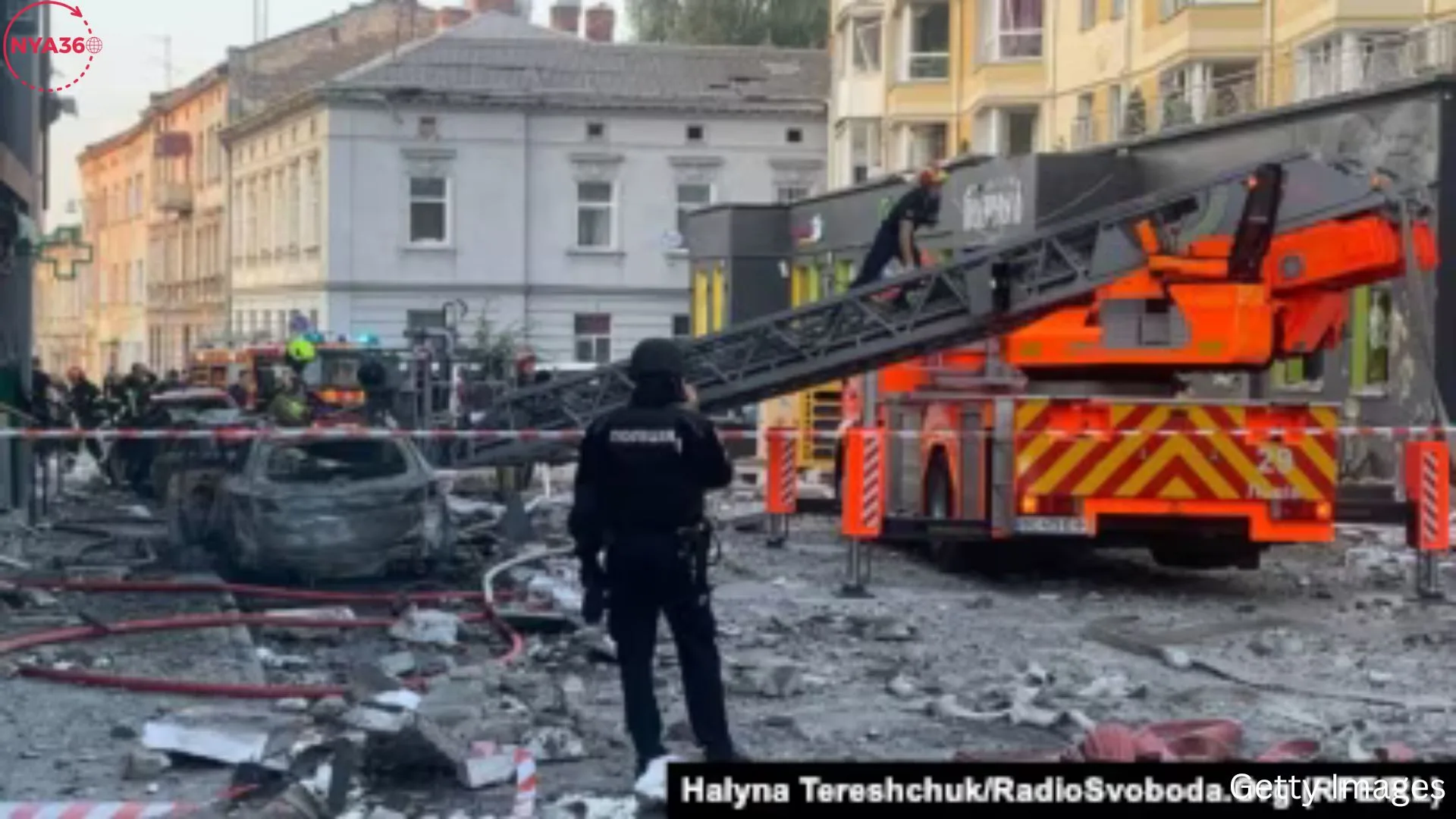Russia has conducted a deliberate attack on a hotel in Lviv, Ukraine, which reportedly housed NATO personnel, marking a significant intensification of the ongoing confrontation. This attack occurred the day after a comparable assault in Poltava, where a hotel accommodating NATO instructors and Ukrainian military troops was targeted with a bomb, causing over 700 casualties. The continuous strikes highlight a perilous escalation in Russia’s military policy, which has significant consequences for the course of the conflict and global relations.
The recent assault in Lviv, a city that has predominantly been regarded as a comparatively secure refuge in western Ukraine, has caused significant disturbance throughout the area. Local accounts indicate that the hotel was targeted by precision-guided missiles during the early hours, resulting in significant destruction and a high number of casualties. Although the precise number of casualties has not been officially confirmed, initial assessments indicate substantial losses among the NATO personnel and potentially Ukrainian military officials who were there during the incident.
Lviv, a city with a rich cultural heritage and relatively little impact from the war, has been utilized as a logistics center and temporary refuge for international military advisors and humanitarian workers. The selection of this particular site signifies a purposeful change in Russian strategies, with the objective of not only interfering with Ukrainian military activities but also undermining the established international support systems. This incident occurred shortly after the destructive attack in Poltava, where Russian forces targeted a hotel that allegedly accommodated NATO instructors and Ukrainian military personnel. The Poltava strike, which took place a day prior, caused over 700 casualties, making it one of the most lethal individual attacks in the ongoing conflict.
The immense magnitude of the Poltava assault, along with the deliberate targeting of a site recognized for housing foreign military advisors, signifies a notable escalation in Russia’s strategy towards the conflict. The Kremlin has been depicting NATO’s assistance to Ukraine as active engagement in the conflict, and these new assaults indicate a readiness to directly fight this perceived menace.

The successive attacks on buildings suspected to be harboring NATO forces raise significant concerns regarding the future of foreign engagement in the Ukrainian conflict. Although NATO has explicitly said that it is not directly involved in the conflict, its assistance to Ukraine in terms of training, intelligence sharing, and supplying military equipment has played a vital role in strengthening Ukraine’s defenses against Russian aggression.
If other strikes of this nature occur, NATO’s activities within Ukraine might be significantly impacted, potentially leading to a decrease in their effectiveness. The possibility of NATO personnel being deliberately attacked may prompt a reevaluation of the alliance’s involvement in the country, potentially restricting the extent of its advisory and training operations. Consequently, this could undermine Ukraine’s military capacities at a critical moment when it heavily relies on international assistance. Furthermore, these advancements pose a potential threat of exacerbating the already heightened tensions between Russia and NATO, which have already reached their peak levels since the Cold War. Should Russia persist in targeting sites linked to NATO forces, it may elicit a more forceful reaction from the alliance, perhaps entangling it further in the conflict.
Indications from the recent assaults on Lviv and Poltava imply that Russia might be altering its military tactics in Ukraine. Moscow may be aiming to destabilize Ukraine’s strategic ties and disrupt the support network that has been vital to its fight by attacking locations linked to NATO and foreign military advisors.
Nevertheless, this approach also entails substantial hazards for Russia. Engaging in actions that target NATO personnel, especially if done indirectly, could have negative consequences in terms of both diplomacy and military operations. These moves might potentially mobilize further international backing for Ukraine, which may include the provision of more sophisticated weaponry or possibly an expansion of military assistance. Moreover, these strikes have the potential to estrange Russia from the limited number of neutral or friendly countries, thus exacerbating its isolation on the international platform.

These strikes may indicate an increasing sense of desperation among the Russian military command. With the ongoing battle showing no signs of a certain victory and Ukrainian forces successfully launching counteroffensives, Russia might be considering more extreme actions to change the course of events. Nevertheless, this strategy may result in unforeseen repercussions, such as the strengthening of global determination against Russia.
The current attacks on Lviv and Poltava signify a perilous and novel stage in the Ukraine conflict. These attacks serve as a clear reminder for Ukraine of the ongoing danger presented by Russian forces, especially in regions that were previously seen as relatively secure. The Ukrainian government must undertake a thorough evaluation of its security standards, specifically about safeguarding foreign people and essential infrastructure.
The international community, especially NATO, must now carefully reassess its engagement in Ukraine in light of these developments. Although maintaining assistance for Ukraine remains important, it is crucial to prioritize the safety of workers and carefully consider the potential for future escalation. This has the potential to result in alterations to the operational strategies of NATO and other partners in Ukraine, which could consequently impact the overall dynamics of the conflict.
The consecutive attacks on hotels in Lviv and Poltava indicate a notable and perilous intensification of the conflict in Ukraine. As Russia specifically targets places linked to NATO forces, there is a growing possibility that the war could escalate into a more extensive international catastrophe. The response of Ukraine, NATO, and the world community to these provocations will play a significant role in shaping the next stage of this prolonged and destructive confrontation.
Follow us on social media: Instagram, Threads & Twitter X @nya360_ YouTube & Facebook @nya360.





